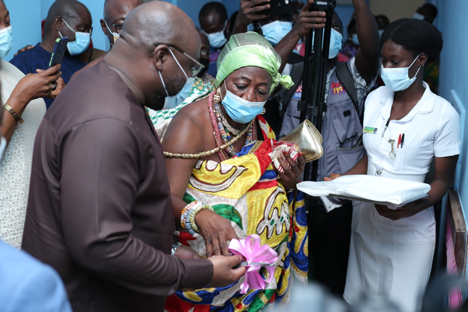- New Cancer Centre is the second speciality cancer centre launched as a part of the expanded partnership between Roche and the Ghana Ministry of Health to improve cancer care in the country
- Hospital to receive funds to produce awareness materials for patients in local languages so they can understand their cancer risk factors and take their health into their own hands.
Roche has announced the launch of the new cancer centre at Ho Teaching Hospital in partnership with the government of Ghana to expand access to oncology services for the Ghanaian people.
The announcement was made by Philip Anderson, General Manager for Roche Ghana; Dr. John Tampouri, CEO of Ho Teaching Hospital; Dr. Patrick Kuma-Aboagye, Director General of the Ghana Health Service; Archibald Yao Letsa, Regional Minister of Volta; and Dr. Baffour Awuah on Behalf of the Minister of Health.
This hospital comes as the second installment of an agreement executed in June in which Roche will work with the Ministry of Health to develop infrastructure to deliver cancer care at three key hospitals across the country.
Launching oncology services in three new cancer treatment centres will further the goal of bridging geographic access barriers to quality cancer care; supporting capacity development and training for health care providers; and supporting awareness creation in communities. The first of these three new cancer treatment centres opened at the Cape Coast Teaching Hospital this June.
“We are honored to have been able to open a second cancer centre in Ho with a third soon to follow in Tamale. Roche is dedicated to working with the local community and government of Ghana to strengthen its health system and empower local healthcare providers to utilise the newest cancer treatments and innovations to provide the best possible care to patients across the country. Our community co-creation approach promises a system that truly serves the local people,” stated Philip Anderson, General Manager for Roche Ghana.
As part of this empowerment approach, Roche is providing funds to the Ho Teaching Hospital to produce awareness materials for patients in local languages so they can understand their cancer risk factors and take their health into their own hands.
Dr. Patrick Kuma-Aboagye, Director General of the Ghana Health Service, said: “Traditionally, the cancer care journey has been hard for patients in Ghana and filled with roadblocks from screening all the way through treatment. One of these barriers has been geographical access to specialised cancer centres, so the launch of the cancer centre in Ho will be a huge and immediate help to people in the surrounding area.”
To ensure there is adequate treatment for those who seek it, creating opportunities to educate and hire more doctors, nurses, radiologists, clinical trial investigators and specialists is crucial to building capacity that meets patient needs and supporting training and skills development for the current medical workforce.
Dr. John Tampouri, CEO of the Ho Teaching Hospital, stated, “The cancer treatment centre in Ho will be a homebase for medical workers in the country to advance their skills, share best learnings from their own experiences, and adapt to new innovative oncology technologies entering the country. A well-trained workforce is the key first step to reducing oncology rates in Ghana and ensuring patients have the best possible outcomes when they step foot into any of our hospitals.”
Roche has long been working to improve oncology care in Ghana and in 2018 signed a Memorandum of Understanding with the Ghana Ministry of Health to conduct disease awareness programmes; increase screening to promote early detection; establish centres of excellence; improve diagnostic facilities at treatment centres; train specialists; develop a national cancer registry to better understand the disease burden; and establish national treatment guidelines. To improve access to innovative breast cancer therapies, Roche also worked with the Ministry of Health and multiple stakeholders to enable public funding of treatment at sustainable access pricing in 2019.
Roche is a global pioneer in pharmaceuticals and diagnostics focused on advancing science to improve people’s lives. The combined strengths of pharmaceuticals and diagnostics under one roof have made Roche the leader in personalised healthcare – a strategy that aims to fit the right treatment to each patient in the best way possible.
Roche is the world’s largest biotech company, with truly differentiated medicines in oncology, immunology, infectious diseases, ophthalmology and diseases of the central nervous system. Roche is also the world leader in vitro diagnostics and tissue-based cancer diagnostics, and a frontrunner in diabetes management.
Founded in 1896, Roche continues to search for better ways to prevent, diagnose and treat diseases and make a sustainable contribution to society. The company also aims to improve patient access to medical innovations by working with all relevant stakeholders. More than thirty medicines developed by Roche are included in the World Health Organization Model Lists of Essential Medicines, among them life-saving antibiotics, antimalarials and cancer medicines. Moreover, for the twelfth consecutive year, Roche has been recognised as one of the most sustainable companies in the Pharmaceuticals Industry by the Dow Jones Sustainability Indices (DJSI).
The Roche Group, headquartered in Basel, Switzerland, is active in over 100 countries and in 2020 employed more than 100,000 people worldwide. In 2020, Roche invested CHF12.2 billion in R&D and posted sales of CHF 58.3 billion. Genentech, in the United States, is a wholly owned member of the Roche Group. Roche is the majority shareholder in Chugai Pharmaceutical, Japan.










